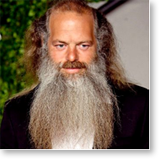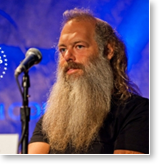 RICK RUBIN is perhaps the most important record producer of the past 25 years. His stamp on contemporary music is considered immense. While still a student at NYU, Rubin borrowed $5,000 from his parents to start the Def Jam label with Russell Simmons. Soon he was working with the cream of the music world — Jay-Z, Johnny Cash, Neil Diamond, Mick Jagger, Sheryl Crowe, U2, the Red Hot Chili Peppers, Adele, Kanye West, Eminem, and the Dixie Chicks, to name a few — transcending musical genres like no other producer before him. In 2007 Rick was named co-head of Columbia Records. That same year MTV called him “the most important producer of the last 20 years,” and TIME magazine included him in its list of the world’s 100 Most Influential People.
RICK RUBIN is perhaps the most important record producer of the past 25 years. His stamp on contemporary music is considered immense. While still a student at NYU, Rubin borrowed $5,000 from his parents to start the Def Jam label with Russell Simmons. Soon he was working with the cream of the music world — Jay-Z, Johnny Cash, Neil Diamond, Mick Jagger, Sheryl Crowe, U2, the Red Hot Chili Peppers, Adele, Kanye West, Eminem, and the Dixie Chicks, to name a few — transcending musical genres like no other producer before him. In 2007 Rick was named co-head of Columbia Records. That same year MTV called him “the most important producer of the last 20 years,” and TIME magazine included him in its list of the world’s 100 Most Influential People.
Rick has practiced the Transcendental Meditation technique for most of his life.
Here are some excerpts from a recent interview with Rick by Annabel Mehran.
“The power of nature is what all art strives to be. The more we can get in tune with the harmony of the planet, the more our art can benefit from that relationship.
Music hits us in a real emotional way. For me, it took me away in a way that nothing else could. It’s just got a tremendous power, the fact that you can do it with your eyes closed. The creative goal of making music is the same as a rainstorm, just the way the waves hit the beach. There’s a perfection that we try to approximate. It’s the goal.
It seemed like when most of the kids I knew [when I was growing up] started taking drugs—it was out of boredom. They’d finish school and have nothing to do, so they’d get high. But I always had other stuff I was really interested in doing. First it was magic and eventually it was music. I’d come home and listen to music and play the guitar. I was never bored. A part of it had to do with my being an only child. I learned how to entertain myself. I think another part of it is that I learned to meditate when I was about 14, and that became a big part of my life.
I was very lucky. My neck hurt and I went to my doctor, who was kind of hip, and he said it was stress-caused and that I needed to learn how to meditate. So I learned how to do Transcendental Meditation.”
I’ve found that the more you understand silence, [the more you understand] that’s where the balance comes.”
I have had a remarkable run. It’s been pretty amazing. I have gone through patches where I’m colder. It’s a normal sort of cycle. But it’s unusual to have worked for so long and have had so many great — unbelievable — successes. It’s hard to believe. The only thing I can attribute it all to is my not trying to be successful, but only trying to make good music. I’m willing to do whatever it takes to make the music as great as can be. I’m not at all lazy and I won’t settle for just anything. I’m a little bit of a perfectionist — I can be miserable if I know things could be better.
People feel at ease around me. I think one of the reasons that the music turns out good is that I can make people feel comfortable and they can be themselves. I try to set up an environment in which artists can be naked and vulnerable, but still feel safe enough to really express themselves. I would say that my ability to put people at ease does play an important role in it all.”
This blog came from www.tmhome.com — an international website dedicated to posting the stories of interest about the Transcendental Meditation technique.







